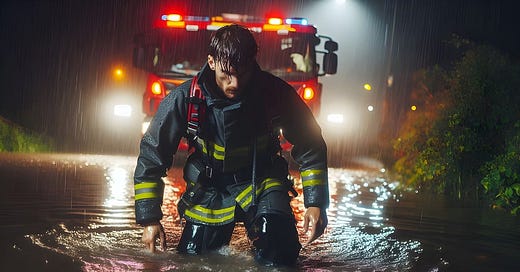As a survivor of more than a dozen disasters including cat 4 hurricanes, lightning strikes, and an earthquake, I have great empathy for people impacted by Hurricane Helene. A few days after Hurricane Andrew struck we left the area to visit family and replace lost clothing for the children and myself. Everyone said, “I understand.” I realized they had no clue. I learned to say; “I cannot imagine what you are going through, but I will listen and pray.”
You want to get back home, and back to normal, but at home there are often terrible smells, mildew, and rubble, plus so much work and so many decisions to make.
First Steps for Victims
For those with damages they need to take as many photo as possible for insurance claims and help from agencies. It’s also good to write out what happened, and start listing the items lost or damaged. Going through FB accounts and photos stored online prompts your mind as to what’s gone.
Hugging Neighbors and sharing what you have helps overcome the shock and makes you realize you are not alone.
Helping Victims
The best things to send are money and gift cards for groceries, hardware, and clothing. To send money, investigate d who is trustworthy on spending and who is on the ground in the impacted areas. Make sure you know which ones use the money directly for helping victims and which ones use much of the money on salaries and orgnizational spending At certain points, sending canned goods helps if the cans have flip tops or you also send a can opener. Consider what does not need cooking.
The next best thing is to volunteer to go and help if you are strong and able to work on homes. Groups are often organized through churches and organizations. N95 masks are needed as sewage mixes with flood waters. Mildew that grows from the flooding means the need to buy special mildew kits and mildew removers for walls, to get rid of smells and eliminate the mildew permanently.
Later there will also be volunteer groups going to pray with victims and to listen to them. They need to talk and share their grief. While still in shock it’s harder for them to even talk. Later is a time to also give spa and luxury items. I gave someone a plate with their last name on it, the first thing personalized item to own as they moved back in.
If you will be volunteering and bringing supplies, bring baked cookies too. The comfort of home brings the hope of future restoration
Hanging onto Hope
The biggest struggle is often hanging onto hope for the long duration of recovery. Good neighbors and survivors from other disasters get it. Getting away for a break can bring its own trauma, when you realize people think they understand but it’s not the same as being in the midst of it and standing amid the damage. It can be difficult to see communities that are untouched by disaster and life going on as normal.
Its good to laugh about the ludicrous, like when one the home of one of our friend’s collapsed and yet a beam remianed with a photo still nailed to it. And it’s good to watch how the plants and trees recover and grow again. Praying and knowing others are praying brings its own comfort. A disaster is not something you get over, but something you get through, one moment at a time, while trusting God.
Self-care
It’s hard not to set a good pace, and not work too hard clearing rubble and digging out muck, but breaks make a difference. Drinking plenty of water that has become a precious commodity keeps you strong.
Sharing what you have with neighbors, and celebrating one step forward with a potluck also brings comfort and hope.
When your home is restored and life gets to a new normal, you will aprreciate what you have and realize a little more what really matters in life. You’ll be stronger for the struggle.





